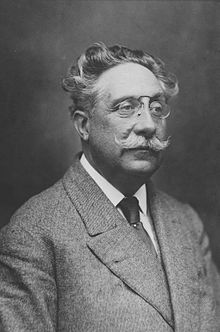João Vaz | |
|---|---|
 João Vaz ( Nogueira da Silva Museum, after 1900) | |
| Born | 9 March 1859 |
| Died | 17 February 1931 (aged 71) |
| Notable work |
|
| Movement | Naturalism |
João José Vaz (9 March 1859, in Setúbal – 17 February 1931, in Lisbon) was a Portuguese painter and decorator who specialized in maritime subjects.
Biography
In 1872, he enrolled at the "Academia das Belas-Artes" (now part of the University of Lisbon), where he studied under António da Silva Porto. [1] He graduated six years later. In 1881, he held his first exhibition at the Lisbon Geographic Society. Later, he exhibited more widely, including displays at the "Sociedade Promotora de Belas-Artes", the Artists' Guild and the "Sociedade Nacional de Belas-Artes". He was also a member of the "Lion's Group", [1] an informal association of artists and writers who met in the Golden Lion Tavern with the goal of promoting Naturalism in the arts.

He was especially well known for his maritime paintings and provided illustrations for several magazines, including Branco e Negro [2] (1896-1898), Atlantida [3] (1915-1920) and Contemporânea [4] (1915-1926).
In 1884, he became a Professor at the "Escola Industrial Afonso Domingues" (named after a 14th-century architect), where he was later promoted to Director. In 1912, he served on a government commission to establish new curricula for commercial and industrial education in the primary and secondary schools. Two years later, he inaugurated the new system at the "Escola de Desenho Industrial de Setúbal".
In addition to his canvases, he provided decorations for many public and private buildings, including the meeting room of the Assembly of the Republic, the Garcia de Resende Theater in Évora, the Buçaco Palace Hotel and the Belém Palace. [1] He also created designs for commemorative postage stamps. [5]
References
- ^ a b c Brief biography @ the Assemblea da República website.
- ^ "Branco e Negro [1896-1898]". Archived from the original on 2014-10-04. Retrieved 2014-11-20. Branco e Negro : semanario illustrado (1896-1898) (digital copy, Hemeroteca Digital)
- ^ Rita Correia (19 February 2008). "Ficha histórica: Atlantida: mensário artístico, literário e social para Portugal e Brasil" (PDF). Hemeroteca Municipal de Lisboa.
- ^ "Contemporânea [1915-1926]". Archived from the original on 2014-10-06. Retrieved 2014-11-20. Contemporânea (1915-1926, digital copy, Hemeroteca Digital)
- ^ Kullberg, Carlos. Selos de Portugal: Álbum I (1853-1910)
Further reading
- João Francisco Envia. Setubalenses de Mérito. Setúbal, 2003.
- Isabel Falcão, Isabel; José Pedro de Aboim Borges; Noémia Ferreira. João Vaz (1859-1931): um pintor do naturalismo. Lisboa, Casa-Museu Dr. Anastácio Gonçalves, 2005. ISBN 972-776-273-5.
- Diogo de Macedo. António Ramalho, João Vaz: um retratista, um marinhista. Lisboa, Museu Nacional de Arte Contemporânea, 1954.
- João Barreto de Morais Vaz. O pintor João Vaz: contributo para o conhecimento da sua vida e obra. 2 vols., Lisboa, 1998. Masters thesis. Digitalized
External links
-
 Media related to
João Vaz at Wikimedia Commons
Media related to
João Vaz at Wikimedia Commons - Arcadja Auctions: more works by Vaz
- Setubal Digital: "João Vaz, Pintor de Marinhas"